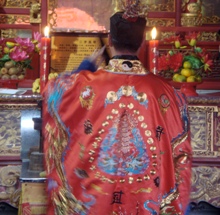| |
|
 |
Guardian newspaper quotes extensively from ARC's China work
February 2, 2009:
 |
 |
 |
ARC is “one of the few outside organisations that have a license from the Chinese government to work with religious groups in the country.” |
The Guardian newspaper last week published a column about religion in China which quoted extensively from ARC’s work in that area.
The column, by philosopher and writer Mark Vernon, featured an interview with ARC’s Secretary General, Martin Palmer. It described ARC as “one of the few outside organisations that have a license from the Chinese government to work with religious groups in the country.”
The column, which explores whether some of the changes in China stem from a relaxed attitude towards freedom of religious expression, describes how the Chinese government approached ARC about making contact with Daoists.
“These invitations struck Palmer as odd, to say the least. After all, this is a regime that had tried to wipe out Daoism,
destroying about 98% of its temples, statues and scriptures.”
 |
 |
 |
Daoist monk at Mao Shan, at a celebration during the Daoists' October 2009 meeting to create Eight Year Plans |
Vernon's article cites several reforms in mainland China in 2008, including the downgrading of the socialist May Day holiday in favour of restoring the more traditional Qing Ming Festival of the Dead (on which Chinese people remember their ancestors) and the Dragon Boat Festival, which commemorates a civil servant called Qu Yuan who some 2200 years ago committed suicide in the sea, rather than follow a government into corruption. Both festivals have been celebrated in Hong Kong as public holidays for many years.
It considers three key factors that have contributed to the Chinese government reconsidering its attitude towards religion.
1. The first is the consequences of the one-child policy. "It completely undermines the notion of the family and the clan." In short, it encourages people to disregard the elders and focus all their hopes and aspirations on the one child.”
2. The second is untrammeled consumerism. "Chinese culture has always previously recognised an underpinning ideology," Palmer explains, referring to Confucianism, republicanism and most recently communism. "It may have been honoured in the breach as much as in observance, but now it is recognised that the country has a problem… nurturing a sense of society, care and ethics.”
3. The almost complete collapse in communism. Palmer reports how officials have told him to ignore the word “communist” in the words Chinese Communist Party: they really work for the "Chinese party". This has led to a relaxing of the rules so that it is now possible to be a member of the party and have a registered religious affiliation. To date, about 40% of party members have "come out" as religious as a result.
Link here for the full article on The Guardian's website.
LinksLink here for Mark Vernon’s website.
Link here for the Daoist Faith Statement on the Environment.
Link here to learn about the Daoist Eight Year Plan introducing Generational Changes to protect the environment, created in October 2008.
Link here for an inspiring article about ARC's links with the Daoists in China, written by the UNDP Deputy Director Olav Kjorven.
|
 |
 |
|
|
|
|
|

